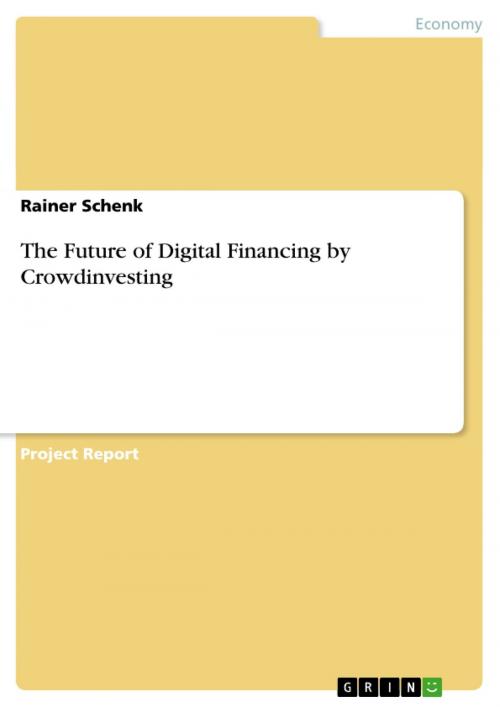| Author: | Rainer Schenk | ISBN: | 9783656623465 |
| Publisher: | GRIN Verlag | Publication: | March 26, 2014 |
| Imprint: | GRIN Verlag | Language: | English |
| Author: | Rainer Schenk |
| ISBN: | 9783656623465 |
| Publisher: | GRIN Verlag |
| Publication: | March 26, 2014 |
| Imprint: | GRIN Verlag |
| Language: | English |
Project Report from the year 2014 in the subject Business economics - Investment and Finance, , language: English, abstract: The phenomenon of 'Crowdinvesting' - a new online means of financing for start-ups and small companies - developed in the USA and is now increasingly taking hold also in Europe and particularly in Germany. By exploiting what is known as the 'collective intelligence' of the crowd of internet users, companies seeking capital are provided with the needed funds. As a return for their monetary contribution, the so-called crowd investors are promised interests and a share in the future value of the company. Throughout 2013, only in Germany about EUR 15 million have been invested via crowdinvesting in a total of 66 business projects. This represents a 250% increase compared with the previous year 2012 . With only a few excep-tions, the projects financed so far via crowdinvesting have been mostly start-ups, mainly in the fields of E-commerce, Commerce and Creative Economy. Whether this form of financing will keep the momentum going and develop into a sustainable and viable funding source de-pends on many different factors. Among those, there is also the future attitude of the banking sector and the State towards granting credits, i.e. funds. Moreover, it remains to be seen, whether crowdinvesting can be a suitable source of funding also for already-established com-panies of the SME sector. A survey carried out by the author in 2013 revealed that the majori-ty of companies already established on the market are not familiar at all with this new online form of financing, yet show interest in it and would be willing to raise capital through this alternative funding method. Still, they would rather use it as a complementary financing com-ponent within a traditional financing mix. Crowdinvesting presents both opportunities and risks. Given the gaps in the current German regulation, companies have the possibility to raise considerably high sums via the internet . The majority of crowdinvesting platforms currently operating on the German market are start-ups themselves and their providers are mostly inex-perienced and do not hold any qualification in the field of Corporate Finance. Furthermore, the platforms' suboptimal workflows and structures, along with a lack of compliance policies, do not offer crowd investors the necessary basis to make a safe investment decision. Given the platforms' inadequate organizational structures and their unidirectional focus on start-ups, there is a substantial risk that the financed projects will fail already during the crowdinvesting co
Project Report from the year 2014 in the subject Business economics - Investment and Finance, , language: English, abstract: The phenomenon of 'Crowdinvesting' - a new online means of financing for start-ups and small companies - developed in the USA and is now increasingly taking hold also in Europe and particularly in Germany. By exploiting what is known as the 'collective intelligence' of the crowd of internet users, companies seeking capital are provided with the needed funds. As a return for their monetary contribution, the so-called crowd investors are promised interests and a share in the future value of the company. Throughout 2013, only in Germany about EUR 15 million have been invested via crowdinvesting in a total of 66 business projects. This represents a 250% increase compared with the previous year 2012 . With only a few excep-tions, the projects financed so far via crowdinvesting have been mostly start-ups, mainly in the fields of E-commerce, Commerce and Creative Economy. Whether this form of financing will keep the momentum going and develop into a sustainable and viable funding source de-pends on many different factors. Among those, there is also the future attitude of the banking sector and the State towards granting credits, i.e. funds. Moreover, it remains to be seen, whether crowdinvesting can be a suitable source of funding also for already-established com-panies of the SME sector. A survey carried out by the author in 2013 revealed that the majori-ty of companies already established on the market are not familiar at all with this new online form of financing, yet show interest in it and would be willing to raise capital through this alternative funding method. Still, they would rather use it as a complementary financing com-ponent within a traditional financing mix. Crowdinvesting presents both opportunities and risks. Given the gaps in the current German regulation, companies have the possibility to raise considerably high sums via the internet . The majority of crowdinvesting platforms currently operating on the German market are start-ups themselves and their providers are mostly inex-perienced and do not hold any qualification in the field of Corporate Finance. Furthermore, the platforms' suboptimal workflows and structures, along with a lack of compliance policies, do not offer crowd investors the necessary basis to make a safe investment decision. Given the platforms' inadequate organizational structures and their unidirectional focus on start-ups, there is a substantial risk that the financed projects will fail already during the crowdinvesting co















